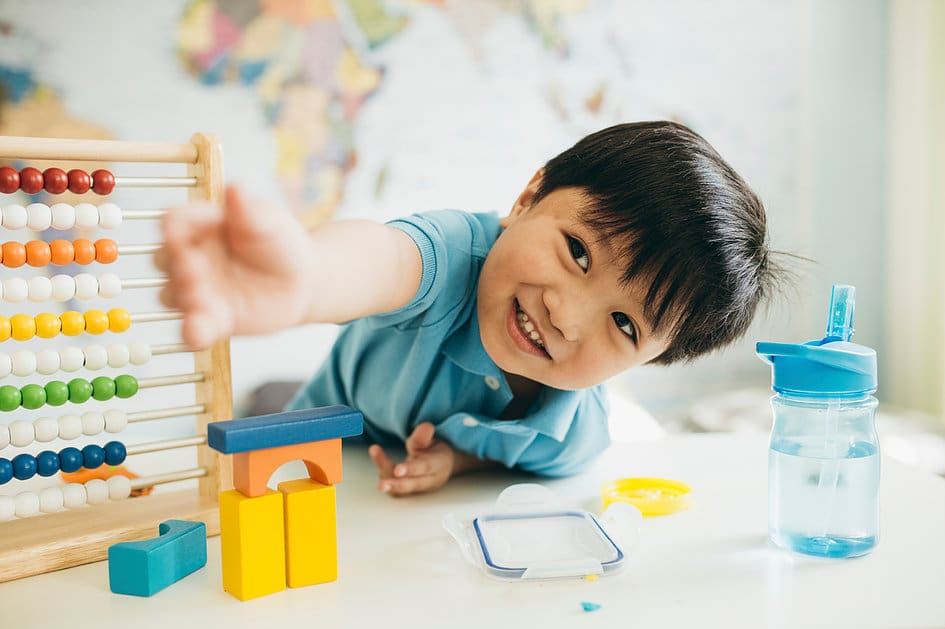
As the parent of a young child, it’s perfectly normal for you to wonder (and yes, sometimes worry) about whether or not they’re on track in terms of their growth and development. Important milestones such as walking, talking, and potty training are often points of concern for eager parents, but bear in mind that there’s no one specific developmental timeline that is universal to all kids.
In fact, there’s quite a broad range for what’s considered a “normal” pace of development, but the vast majority of children will reach their anticipated milestones within the generally expected time frame. Below are some commonly accepted guidelines to help you know whether or not your toddler is on track for their age.
Talking
Your toddler will learn the majority of their early language skills by “full immersion”–in other words, by simply listening to others and attempting to imitate what’s being said. By their first birthday, your child will typically develop a vocabulary of a handful of basic one or two-syllable words, and over the next few months, they may even be able to communicate their needs using simple words–e.g., saying “up” when they want to be carried.
Between 12 to 18 months, your child will probably develop a more robust vocabulary, including common nouns that represent objects in their daily life including “spoon,” “car,” “dog,” “food,” etc. They’ll also develop the ability to more clearly pronounce various consonant sounds (d, n, t, h, and w), which will lead to a pretty big boost in their vocabulary.
By their second birthday, your child will typically know how to construct basic sentences (e.g., “We go”), and between ages 2 and 3, their vocabulary will blossom to roughly 200 words or more.
Walking
Most babies start taking their first steps anywhere between 9 to 12 months old, but the age range for learning how to walk can extend out as far as 16 or 17 months. Generally speaking, most toddlers are fully mobile by the time they reach 14 or 15 months old, but before that time, they’ll probably engage in a lot of “cruising”–i.e., holding on to a table, chair, couch, or anything else they can find in order to help them balance and take small “scooting” steps. Those first steps are a critical point in time that marks the beginning of their independence, and once they start walking, you’re going to have a time keeping up with them!
Cognitive Skills (Learning, Problem-Solving, Thinking)
Between 18 to 24 months old, your child should be able to recognize basic objects (e.g., spoon, phone, brush, bottle, etc.), or even point to them when you call them out. They can scribble or doodle on paper with crayons, and they’ll probably be able to identify basic shapes (e.g., triangle, circle, square, etc.) as well. They’ll start asserting their independence a little more, and will want to do things on their own, such as getting dressed or eating with utensils. At this point, you might even begin to notice whether your child is right- or left-handed.
Potty Training
This is a tough one for a lot of parents. Every child is different, which means that some kids master the art of the potty visit at only 24 months old, while others may not get the hang of it until they’re 3 or 4 years old. Either way it goes, there’s really no cause for concern, because the developmental timeline for potty training is quite broad.
Generally speaking, most kids will have the potty completely figured out by the time they’re 5 years old. For the majority of kids, potty training will take about 3 to 6 months to master, but again, there will always be perfectly normal kids who fall outside of the “typical” range. As they’re developing this all-important skill, just remember to praise any and all progress, and treat any accidents with kindness and patience.
The above guidelines can help you establish a good gauge for your child’s progress, and it can also help you identify any potential issues. If you’re concerned that your child isn’t developing at a healthy rate, keep in mind that acting early to remedy the situation is one of the best things you can do. If you notice any developmental delays, talk to your child’s doctor so that your toddler can be screened for general development by a qualified professional.

